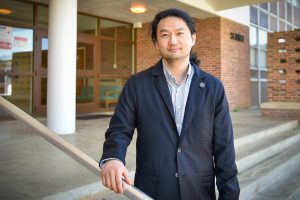Grambling Partners with LSU Health Sciences Center Shreveport, Louisiana Tech to Share COVID-19 Data
The Rockefeller Foundation Awards Grant to LSUHS to Strengthen Genomic Sequencing to Respond to Pandemic Threat; Dr. Paul Kim to Lead Effort at GSU

NEW YORK – June 9, 2021 – The Rockefeller Foundation today announced over $20 million in funding and several non-financial collaborations to help strengthen global capabilities to detect and respond to pandemic threats. The goal is to strengthen organizations’ abilities to sequence and share genomic and other data. Comprised of over 20 public, private, and non-profit organizations, this network will help shape The Rockefeller Foundation’s pandemic prevention institute.
One of the grant projects brings together teams at LSU Health Sciences Center (LSUHS) Shreveport, Louisiana Tech University and Grambling State University (GSU) to establish an equitable and transparent regional surveillance hub based in north Louisiana along the I-20 and I-49 corridors. This hub will reach across several medically-underserved populations within the greater south central and south central United States.
The three teams will work together to generate and rapidly share SARSCoV-2 (which causes COVID-19) genomic surveillance data by building trust-based relationships with underrepresented communities and the organizations that serve their needs.
Under the leadership of Dr. Paul Kim, an assistant professor at GSU, the Department of Biological Sciences, the School of Nursing, and the School of Social Work will collaborate with the LSUHS Center of Emerging Viral Threats to increase sequencing by addressing barriers such as medical mistrust, lack of mobility, and limited access to healthcare for the predominately African-American and low-income population of north/central Louisiana.
Genomic sequencing allows health officials and scientists to study prolonged outbreaks, understand behaviors that spread COVID-19, and map coronavirus clusters.
“Fast, accurate genomic sequencing information is the key to ending the COVID-19 pandemic and the suffering it has caused. Yet today only 14 countries, all of which have developed economies, are sequencing five percent or more of their cases and sharing them through global databases,” said Rajiv J. Shah, President of the Rockefeller Foundation. “For that reason, The Rockefeller Foundation is strengthening global sequencing capacity – to end this pandemic for all as soon as possible.”
These initial grants and agreements will expand country and regional capacity for sequencing the genomes of pathogens in sub-Saharan Africa, India and the United States, as well as strengthen a global network of genomic sequencing information that is accessible across the world. They represent the first step in the development of The Rockefeller Foundation’s pandemic prevention institute. The institute will collaborate other pandemic prevention efforts, including the WHO Hub for Pandemic and Epidemic Intelligence and the UK’s Global Pandemic Radar and other pandemic prevention efforts, to identify disease outbreaks early and stop them in the first 100 days.
As COVID-19 variants continue to drive surges of outbreaks, reliable genomic surveillance will help accelerate timely analysis and inform response measures to keep countries one step ahead of the virus and counter emerging threats in the future.
“As the virus evolves, we have to ensure that vaccines, our best tools for stopping it and its deadly toll on individuals, families and communities, remain effective,” said Dr. Rick Bright, Senior Vice President of Pandemic Preparedness at The Rockefeller Foundation. “Rapidly sharing genomic sequencing information from all corners of the globe enables us to see and understand how the virus is changing and adapt our tools accordingly. Without this information we risk the pandemic continuing to wreak havoc on our lives.”
COVID-19 demonstrated that the world was ill-prepared to combat a novel pathogen. Before the next pandemic strikes, modernizing the global infrastructure for pandemic preparedness and prevention is critical. The Foundation is working in close partnership with other organizations that share this vision to leverage comparative strengths to transform global capacity.
The Rockefeller Foundation looks forward to collaborating closely with other pandemic prevention efforts, including the WHO Hub for Pandemic and Epidemic Intelligence and the UK’s Global Pandemic Radar, after the G7 Summit to ensure resources are used most efficiently and effectively, and that all partners are playing to their strengths and not duplicating efforts..
The grants and collaborations announced today are a part of the Foundation’s continuing commitment to end the COVID-19 pandemic, while working to prevent the next one and catalyzing an equitable, sustainable global recovery. They form the building blocks of a pandemic prevention institute that will work alongside other initiatives to identify, analyze and inform responses to emerging outbreaks before they become global catastrophes. This global institute will help bring new, innovative ideas to the forefront of global discussions, enable leaders to better detect and manage outbreaks, and ultimately support a world free of pandemics once and for all.
During the COVID-19 pandemic, the Foundation has stepped up to support expanded access to smart testing and vaccines, worked with leaders to cement ideas for scaling genomic sequencing capacity in the United States in “Getting Ahead of the Pandemic: Accelerating National Genomic Surveillance Capacity” and accompanying implementation framework, published actionable recommendations to catalyze the role of testing and tracing within India’s pandemic response system in “The Road Ahead for Smart Testing and Tracing in India.”
The Rockefeller Foundation
The Rockefeller Foundation is a pioneering philanthropy built on collaborative partnerships at the frontiers of science, technology, and innovation to enable individuals, families, and communities to flourish. We work to promote the well-being of humanity and make opportunity universal. Our focus is on scaling renewable energy for all, stimulating economic mobility, and ensuring equitable access to healthy and nutritious food. For more information, sign up for the organization’s newsletter at rockefellerfoundation.org and follow us on Twitter @RockefellerFdn.

